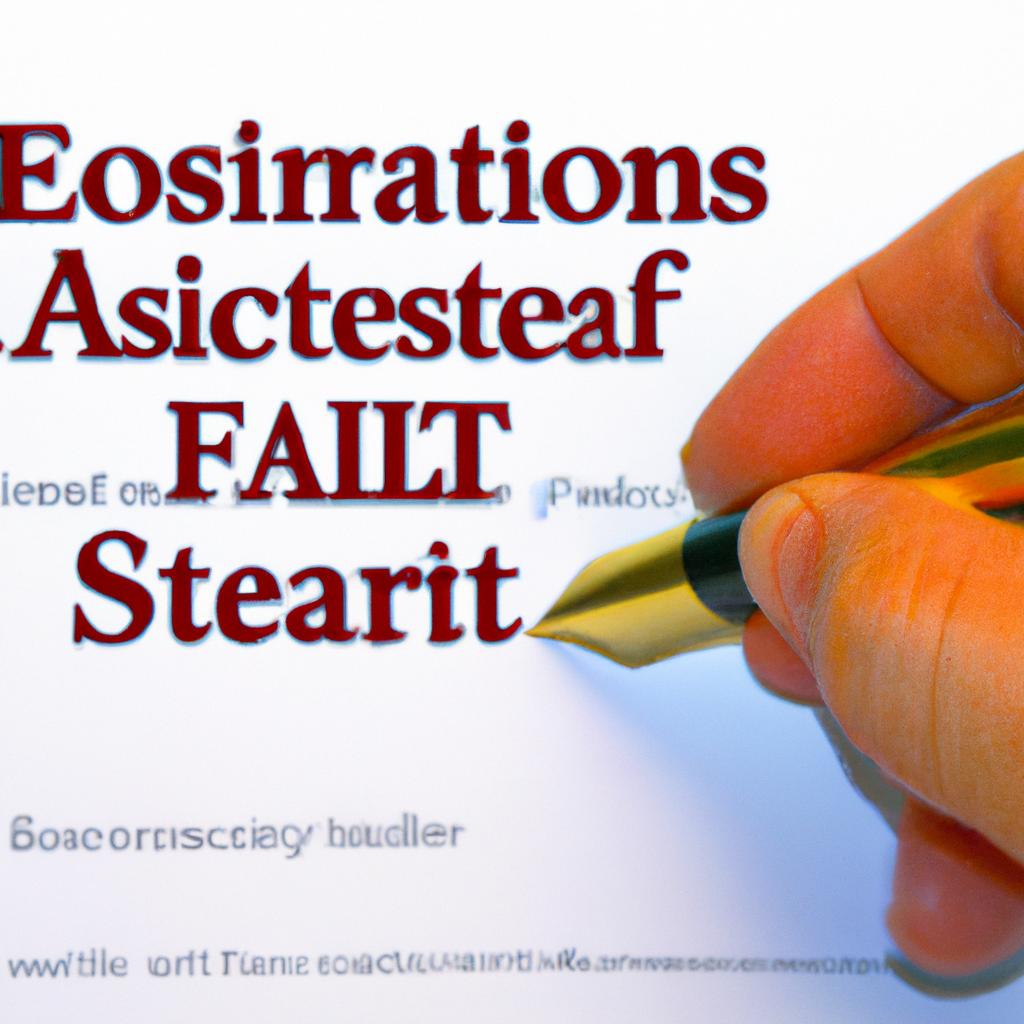In the complex world of estate planning, the importance of establishing an estate account cannot be overstated. A carefully crafted estate account serves as a cornerstone in the preservation and transfer of assets, ensuring the wishes of the deceased are carried out with precision and efficiency. As experienced practitioners in the field of law, the Morgan Legal Group in New York City is well-versed in the intricate nuances of estate accounts and their pivotal role in the probate process. Join us as we delve into the purpose of estate accounts and unravel their significance in the realm of estate planning and administration.
Importance of Establishing an Estate Account
When it comes to managing your assets and ensuring they are properly distributed according to your wishes, establishing an estate account is of paramount importance. An estate account serves as a centralized location for all of your financial assets, making it easier for your designated executor to manage your estate efficiently. Through an estate account, you can protect your assets, ensure timely payment of bills and taxes, and facilitate the distribution of assets to your beneficiaries.
By setting up an estate account, you can avoid potential disputes among your heirs and minimize the risk of probate delays. This account can also help streamline the probate process and provide a clear record of your financial affairs for your loved ones. Additionally, an estate account can help protect your assets from creditors and ensure that your estate is distributed in accordance with your wishes. In short, establishing an estate account is a crucial step in proper estate planning that can provide peace of mind for you and your family.

Managing Assets and Debts Effectively
is crucial for ensuring financial stability and security for yourself and your loved ones. One important aspect of this is setting up an estate account. An estate account is a specialized bank account used to manage the assets and debts of a deceased individual’s estate. It serves several key purposes in the estate planning process, including:
- Consolidating Assets: An estate account allows for the consolidation of the deceased individual’s assets, making it easier to manage and distribute them according to the terms of their Will or trust.
- Paying Debts and Expenses: The estate account can be used to pay off any outstanding debts, taxes, or expenses of the deceased individual, ensuring that their financial affairs are properly settled.
| Date | Transaction Description | Amount |
|---|---|---|
| 01/15/2022 | Payment of Funeral Expenses | $5,000 |
| 02/01/2022 | Settlement of Credit Card Debt | $10,000 |
Overall, an estate account plays a crucial role in the efficient management of assets and debts during the probate process. At Morgan Legal Group, our experienced estate planning attorneys can help you establish and manage an estate account as part of your comprehensive estate plan. Contact us today to learn more about how we can assist you in managing your assets and debts effectively.

Ensuring Smooth Transfer of Assets Upon Death
It is essential to understand the purpose of an estate account to ensure a smooth transfer of assets upon death. An estate account is a financial account established to hold assets and manage the distribution of funds after an individual passes away. This account plays a crucial role in settling debts, paying taxes, and distributing assets to beneficiaries.
Having an estate account helps to streamline the probate process and ensures that your assets are distributed according to your wishes. By centralizing all financial transactions related to the estate, the account simplifies the administration of the estate and provides transparency to all parties involved. Additionally, an estate account can help protect assets from creditors and legal disputes, safeguarding your legacy for future generations.

Protecting Assets from Creditors and Probate Costs
When considering ways to protect your assets from creditors and probate costs, establishing an estate account can be a crucial step in the planning process. An estate account serves multiple purposes, including ensuring that your assets are properly managed and distributed according to your wishes, while also protecting them from potential creditors and probate expenses.
By creating an estate account, you can designate specific assets to be held in a trust or other legal entity, safeguarding them from potential claims made by creditors. Additionally, having an estate account can help streamline the probate process, reducing costs and complexities for your beneficiaries. This can ultimately provide peace of mind knowing that your assets will be protected and efficiently transferred to your loved ones.
Q&A
Q: What is the purpose of an estate account?
A: An estate account is used to manage the financial affairs of a deceased individual’s estate.
Q: Why is it necessary to have an estate account?
A: Having an estate account allows for the proper distribution of the deceased person’s assets and ensures that their debts and expenses are paid off.
Q: Who typically manages an estate account?
A: The executor or administrator of the deceased person’s estate is usually responsible for managing the estate account.
Q: What types of transactions are conducted through an estate account?
A: Transactions such as paying off debts, taxes, funeral expenses, and distributing assets to beneficiaries are commonly conducted through an estate account.
Q: How long is an estate account typically active for?
A: The length of time an estate account remains active can vary depending on the complexity of the estate, but it is typically active until all debts are settled and assets are distributed to the beneficiaries.
Q: Are there any legal requirements for an estate account?
A: Yes, there are legal requirements for an estate account, such as obtaining a tax identification number and keeping accurate records of all transactions.
In Retrospect
In conclusion, estate accounts serve a vital purpose in managing the financial affairs of a deceased individual and ensuring that their assets are distributed according to their wishes. By providing a centralized and transparent way to handle the complex logistics of settling an estate, these accounts offer peace of mind to both the deceased and their loved ones. Whether it’s paying outstanding debts, finalizing property sales, or distributing inheritances, estate accounts play a crucial role in bringing closure to a person’s life and legacy. So, next time you’re faced with the task of navigating the intricacies of estate planning, remember the importance of having a well-managed estate account to guide you through the process.
 The purpose of an estate account is to protect and manage assets left behind by an individual after their passing. This account serves as a way to transfer and distribute the deceased’s assets, pay off any outstanding debts, and manage expenses related to the administration of the estate. In this article, we will delve into the details of an estate account, its importance, and how it can be managed effectively.
The purpose of an estate account is to protect and manage assets left behind by an individual after their passing. This account serves as a way to transfer and distribute the deceased’s assets, pay off any outstanding debts, and manage expenses related to the administration of the estate. In this article, we will delve into the details of an estate account, its importance, and how it can be managed effectively.
Why is an Estate Account Necessary?
Death is an inevitable part of life, and planning for it is crucial to secure the financial future of loved ones. An estate account is a vital component of estate planning as it helps to ensure that the deceased’s wishes and intentions are carried out effectively. Here are some key reasons why an estate account is necessary.
1. Distribution of Assets
One of the primary purposes of an estate account is to facilitate the distribution of assets left behind by the deceased. This includes real estate, financial investments, personal possessions, and any other valuable assets. It acts as a central repository of the deceased’s assets and helps to avoid any confusion or disputes among family members.
2. Payment of Debts
An estate account also serves to pay off any outstanding debts of the deceased. Upon the passing of an individual, their debts do not disappear. The estate account helps to settle these debts, including mortgages, loans, credit cards, and other financial obligations. It ensures that the assets are not tied up due to unpaid debts and can be transferred to the beneficiaries efficiently.
3. Administration Expenses
The administration of an estate can be a complex and time-consuming process. The estate account is used to cover the expenses related to the administration of the estate, such as legal and accounting fees, property taxes, and funeral costs. It also eliminates the need for family members to use their personal funds to cover these expenses.
How Does an Estate Account Work?
An estate account is typically opened by the executor or administrator of the deceased’s estate. This can be a trusted family member, friend, or a legal representative appointed by the court. The executor is responsible for managing and distributing the deceased’s assets following the instructions in the will. They are also responsible for maintaining accurate records of all transactions made from the estate account.
The first step in the process is to obtain a federal tax ID number for the estate from the IRS. This number is used to identify and track the account and will be required when reporting income and filing taxes for the estate. The executor can then transfer the assets from the deceased’s individual accounts to the estate account.
Once the estate account is set up, the executor can start paying debts and expenses related to the estate. They must keep detailed records of all expenditures and must consult with the beneficiaries regarding any major financial decisions. The executor also has the responsibility of distributing the assets to the beneficiaries according to the instructions in the will.
Managing an Estate Account Effectively
Managing an estate account can be a daunting task, especially during a time of grief. Here are some practical tips to help manage an estate account effectively.
1. Keep Detailed Records
It is essential to maintain accurate and detailed records of all expenses and transactions made from the estate account. This will help to provide transparency and avoid any disputes among family members.
2. Consult with Professionals
Seeking the assistance of legal and financial professionals can help to simplify the process of managing an estate account. They can provide valuable advice on tax implications, estate laws, and proper management of assets.
3. Communicate with Beneficiaries
It is crucial to keep the beneficiaries of the estate informed about the decisions and expenses related to the estate account. Regular communication can help to avoid misunderstandings and conflicts.
Benefits of an Estate Account
Apart from the primary purpose of distributing and managing assets, an estate account offers many other benefits. Some of these include:
1. Protection of Assets
An estate account helps to safeguard the assets of the deceased from being misused or wasted. It ensures that the assets are managed in a responsible and efficient manner, in accordance with the wishes of the deceased.
2. Tax Planning
An estate account can also help to minimize tax implications and avoid potential penalities. Financial professionals can assist in planning for taxes and reducing the tax burden on the beneficiaries.
3. Peace of Mind
Having a well-managed estate account can provide peace of mind to the deceased’s loved ones. It eliminates the burden of managing financial matters during a difficult and emotional time and ensures that the final wishes of the deceased are carried out efficiently.
In conclusion, an estate account plays a vital role in estate planning and asset management after an individual’s passing. It is essential to establish an estate account and manage it effectively to ensure that the assets are distributed according to the deceased’s wishes. Seeking the assistance of professionals and keeping detailed records can help to simplify the process and provide peace of mind to loved ones.

